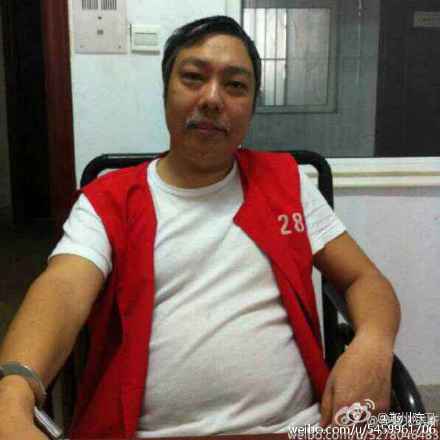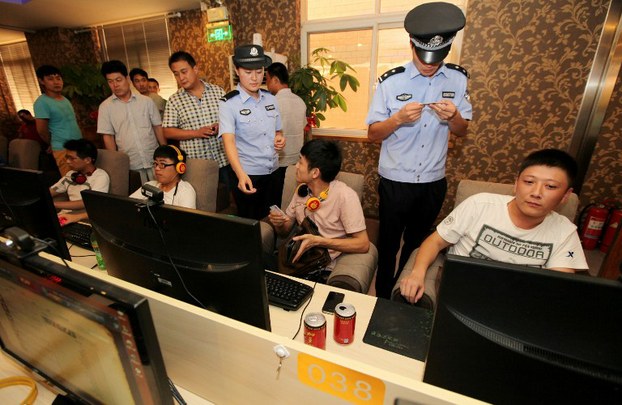
Police check the ID cards of netizens at an Internet cafe in Shandong province, July 31, 2013. ImagineChina
China’s powerful internet regulator has further ratcheted up controls on what the country’s 700 million netizens can see online, requiring round-the-clock monitoring of all live-streaming and holding editorial chiefs personally responsible for “problem” content.
New rules issued by the powerful internet regulation agency, the Cyberspace Administration, require editors-in-chief to monitor their sites’ ouput 24 hours a day to ensure “correct orientation, factual accuracy and appropriate sourcing.”
The new rules follow a number of embarrassing gaffes surrounding the reporting of President Xi Jinping, who recently called on the country’s media to remember its loyalty to the ruling Chinese Communist Party.
Last month, major internet portal Tencent fired its top editor after an apparent typo said Xi had delivered a “furious,” rather than an “important” speech on the anniversary of the party’s founding on July 1.
Authorities also detained a number of writers and editors at online news portal Wujie after a mysterious and anonymous call for Xi’s resignation was posted to its website in March.
And in February, the Shenzhen edition of the Southern Metropolis Daily published a front page containing an apparently inadvertent acrostic that read: “If the media belongs to the party, its ashes will be scattered at sea.”
China has already moved to ban the country’s internet portals like Tencent and Sina from conducting any independent journalism of their own, requiring them to post syndicated content from the state-run Xinhua news agency and state broadcaster CCTV instead.
Now, the agency is warning websites to avoid clickbait, and to act with “responsibility and restraint” when publishing content online, Xinhua news agency reported.
Tightened controls
Wang Yanjun, deputy editor of the reform-minded political journal Yanhuang Chunqiu, said the move will further tighten controls on online content, which is already limited by a system of blocks, filters, and human censorship known as the Great Firewall.
“They are saying that they won’t pursue the reporter, but rather the editor-in-chief, if there’s a problem somewhere with the content,” Wang said.
“That means that editors are going to be a lot more careful from now on when giving instructions to reporters.”
He said the aim of the new rules is to step up control of public opinion.
“No dissenting opinions are allowed, and when dissenting voices are no longer heard, they will think they have achieved their aim,” Wang said.
“But actually that’s a very naive approach; it’s much harder than that. How do you control what people actually think?”
One of the activities targeted in the new guidelines, which came out of a recent internet management summit, is live-streaming, which must now be monitored around the clock.
Live streaming is hugely popular in China, particularly among younger people, who can amass huge followings to their individual channel.
Stability maintenance
Hebei-based veteran journalist Zhu Xinxin said the additional pressure on individual website editors is a sign that the authorities are unable to effectively monitor online content any more by themselves.
He said the move takes the country further away from the rule of law.
“This is management of information by political ideas, not by law,” Zhu said. “That’s why they keep producing an endless stream of directives and guidelines.”
And online activist Li Fei said the measures form part of the nationwide domestic security apparatus known as “stability maintenance.”
“These measures are clearly an attempt to deepen stability maintenance … but the country is getting less and less stable,” Li said.
“They don’t want to see any negative comments appearing online for the whole world to see, especially ahead of the G20 summit [in Hangzhou in early September],” he said.
Jiangsu-based netizen Shen Aibin agreed.
“Everything we read, hear, and watch online is controlled by them … so that means there isn’t really anything real online at all any more,” Shen said.
“We are being forcibly brainwashed by them, and any factual content that has to do with social justice gets deleted,” he said.
Reported by Yang Fan for RFA’s Mandarin Service, and by Wong Lok-to for the Cantonese Service. Translated and written in English by Luisetta Mudie.
Source: http://www.rfa.org/english/news/china/monitor-08192016104723.html
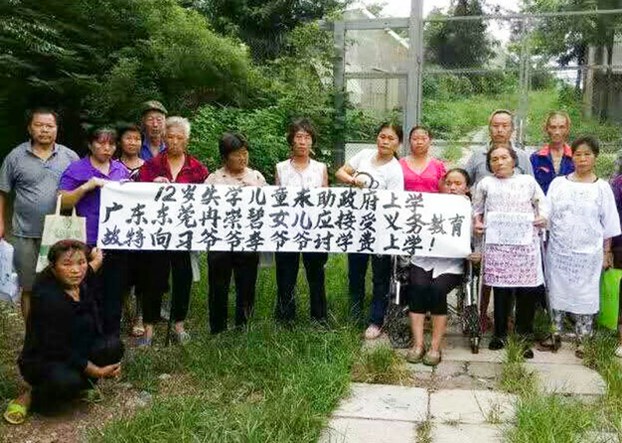


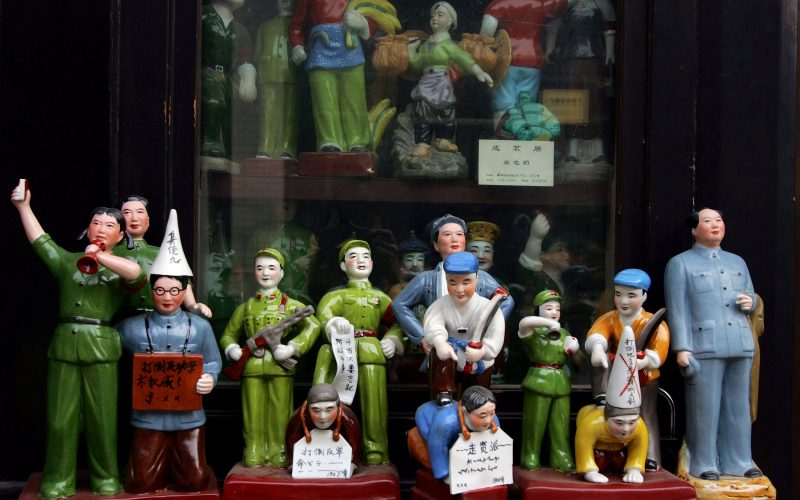
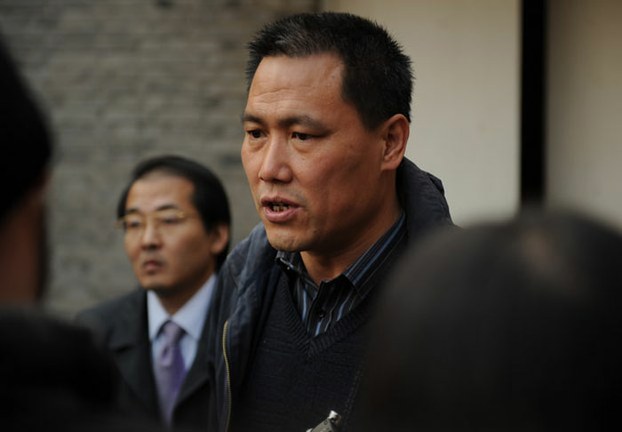
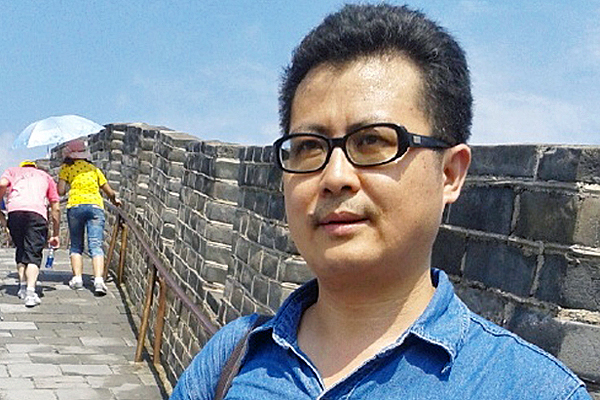
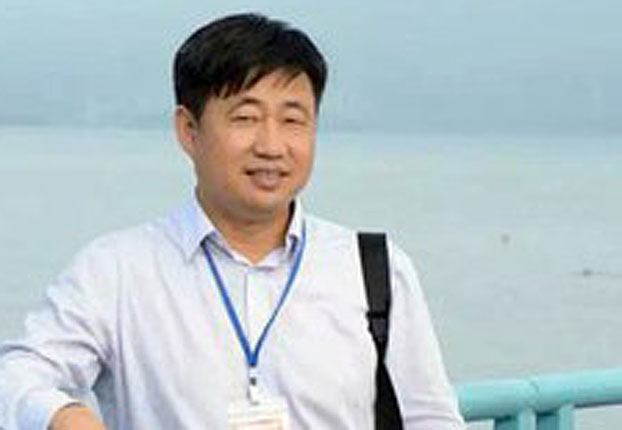
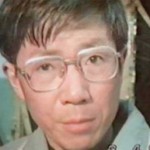 Qin Yongmin (August 11, 1953 – ), a worker, social activist and editor of independent magzines, was taken into custody for his involvement in Wuhan’s Democracy Wall Movement and for uniting magazines throughout China. In 1982, he was sentenced to eight years imprisonment for “counter-revolutionary propaganda and incitement”.
Qin Yongmin (August 11, 1953 – ), a worker, social activist and editor of independent magzines, was taken into custody for his involvement in Wuhan’s Democracy Wall Movement and for uniting magazines throughout China. In 1982, he was sentenced to eight years imprisonment for “counter-revolutionary propaganda and incitement”. 